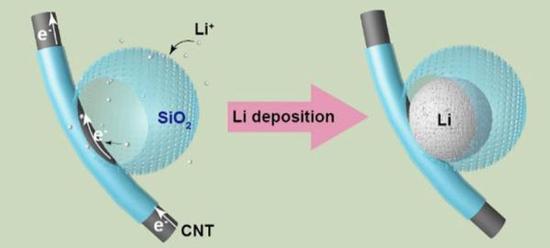
A dichjarazione di privacy: A vostra privacy hè assai impurtante per noi. A nostra cumpagnia prumette micca di divulgà a vostra infurmazione persunale à qualsiasi expana cù i vostri permessi espliciti.
With the rapid development of portable electronic devices and electric vehicles, people are more concerned with the safety of lithium batteries, in addition to the large capacity and charging and discharging speed of lithium batteries. Repeated explosions of lithium batteries inevitably make people nervous. From a scientific point of view, the reason for the explosion of a lithium battery is usually the uneven deposition of lithium on the surface of the electrode, which results in the growth of dendrites, which reduces the efficiency of the battery's charge and discharge, and even causes a short circuit within the battery, causing battery failure or safety hazards. .
Scientists are trying to find a solution. Recently, Chinese scholars proposed the use of a microspheres structure to trap lithium to limit lithium deposition and inhibit dendrite growth.
Because dendrite growth is inhibited, after more than 200 charge-discharge cycles, the electrode can maintain a high electroplating/peeling efficiency of 99%. This not only helps to prolong the life of the lithium battery, but also effectively improves the safety.
The above research came from the research team of Guo Yuguo, a researcher at the Molecular Nanostructure and Nanotechnology Key Laboratory of the Institute of Chemistry, Chinese Academy of Sciences. The study was recently published in the Nano Letters, a journal of the American Chemical Society.

Image courtesy of Guo Yuguo et al.'s paper on Nano Letters
The specific method proposed by the Guo Yuguo team is to capture lithium through the microsphere structure to limit its deposition and inhibit dendrite growth. The prepared microspheres are composite materials of carbon nanotubes and porous silica protective layers. Experiments show that the composite materials of this structure are very effective for controlling lithium deposition behavior. In addition, the insulating coating prevents electrons from flowing centrally and reduces the possibility of "hot spots."
It is understood that Guo Shaojun's research group has designed an ion gel electrolyte with a special functional group-modified silica as the backbone by learning from the characteristics that natural ant colonies can quickly exchange air. This biomimetic ion gel electrolyte has the ability to rapidly transfer lithium ions, and can spontaneously form a particle-rich layer on the surface of the metal lithium negative electrode, thereby effectively suppressing the growth of lithium dendrite. This achievement provides a new idea for designing high-performance lithium metal batteries using bionic concepts.
Guo Yuguo's team believes that this study provides a new idea for the design of lithium metal electrodes and can accelerate the practical application of lithium batteries.
Previously, in solving the safety problem of lithium batteries, many methods were used in the industry, such as electrolyte additives, stable interfaces, and modified electrodes. Experiments have shown that the use of an architecture to adjust lithium dendrite accumulation is the most efficient way.
Guo Shaojun's research group of the School of Engineering of Peking University and Chen Renjie's research group of Beijing Institute of Technology have jointly proposed a method for inhibiting lithium dendrites through the solid electrolyte of the "ant quill" structure. The team's research paper was formally published in June 2017 in the international academic journal Energy & Environmental Science.
September 19, 2024
E-mail à stu dispunizatore
September 19, 2024

A dichjarazione di privacy: A vostra privacy hè assai impurtante per noi. A nostra cumpagnia prumette micca di divulgà a vostra infurmazione persunale à qualsiasi expana cù i vostri permessi espliciti.

Cumplete più infurmazioni per chì si pò cuntattà cun voi più veloce
A dichjarazione di privacy: A vostra privacy hè assai impurtante per noi. A nostra cumpagnia prumette micca di divulgà a vostra infurmazione persunale à qualsiasi expana cù i vostri permessi espliciti.